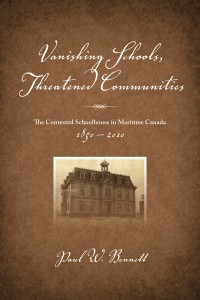Author Says Quality of Education, Not Infrastructure, Is What Matters

Vanishing Schools, Threatened Communities
The Contested Schoolhouse in Maritime Canada 1850–2010
When it comes to education, bigger doesn’t mean better, and maintaining schools is essential to maintaining communities, says a Halifax author.
Paul Bennett launched his book Vanishing Schools, Threatened Communities: The Contested Schoolhouse in Maritime Canada at the York Sunbury Museum on Monday night with a talk about why community schools are important during a time when talks of closing small schools dominates the public education agenda.
“Educators are great organizers … They always think first of organizing and managing people and directing them to their purposes. That’s why in spite of the fact people keep saying, ‘Why aren’t children first in education?’ It’s because the adults tend to focus more on structure, centralization and organization,” he said.
“You get a much more efficient system, but one that doesn’t allow as much public participation. The student-teacher relationship is critical. People are getting further and further removed from that relationship.”
Bennett’s research indicates New Brunswick is the most advanced province in the Maritimes in terms of moving toward centralization following the decision to abolish school boards in 1996.
He said the problem with a centralized system comes down to the effect it has on accountability. Like in a small town, people know one another when they come from a small school.
As a result, he said, there’s a greater interest to ensure children do well.
“Like you worry if a child doesn’t read. You don’t just say, ‘We’ve got reading recovery. Dump them over there’ … It’s an argument for community schools and their future. We’ve got to find a structure that allows them to flourish,” he said. “The best accountability is that of a teacher, a parent and a student, and if you erect structures and organizations between them, there’s less accountability.”
The other problem Bennett sees in New Brunswick comes down to how decisions are arrived at related to school closures.
He said the formula doesn’t take the quality of education received at small schools into account and that in many cases, the attention a child receives from a teacher means more to parents than the physical resources that are available.
Will van den Hoonaard, a member of the Save Our School-Douglas group, said he corresponded with Bennett via email before he arrived in Fredericton and agrees with him on the role of the school and the community.
“I love his idea of the big-box schools. To me, I myself talk about warehousing-warehousing children and people. I really don’t like that,” he said.
Regarding discussions about the Douglas school, van den Hoonaard said the group met with the Education Minister Jody Carr last week to talk about the future of the school, and although the situation is delicate, it feels good about the way it went.
“We brought our findings and our research, so we’re waiting for his decision and we’ve done all we could,” he said. “So we’re at a time where we’re waiting, and hopefully, he’ll make a good decision.”
Bennett said the group should make sure it’s prepared to fight for the school.
“Learn the rules and understand school closure process, and if you have a lawyer in your community, make sure that you have him at your side,” he said.
“School boards spend an incredible amount of money on legal advice, they might spend $100,000 to close a school. So you’re no match for them.”-Tara Chislett, Daily Gleaner, Tuesday May 31, 2011

